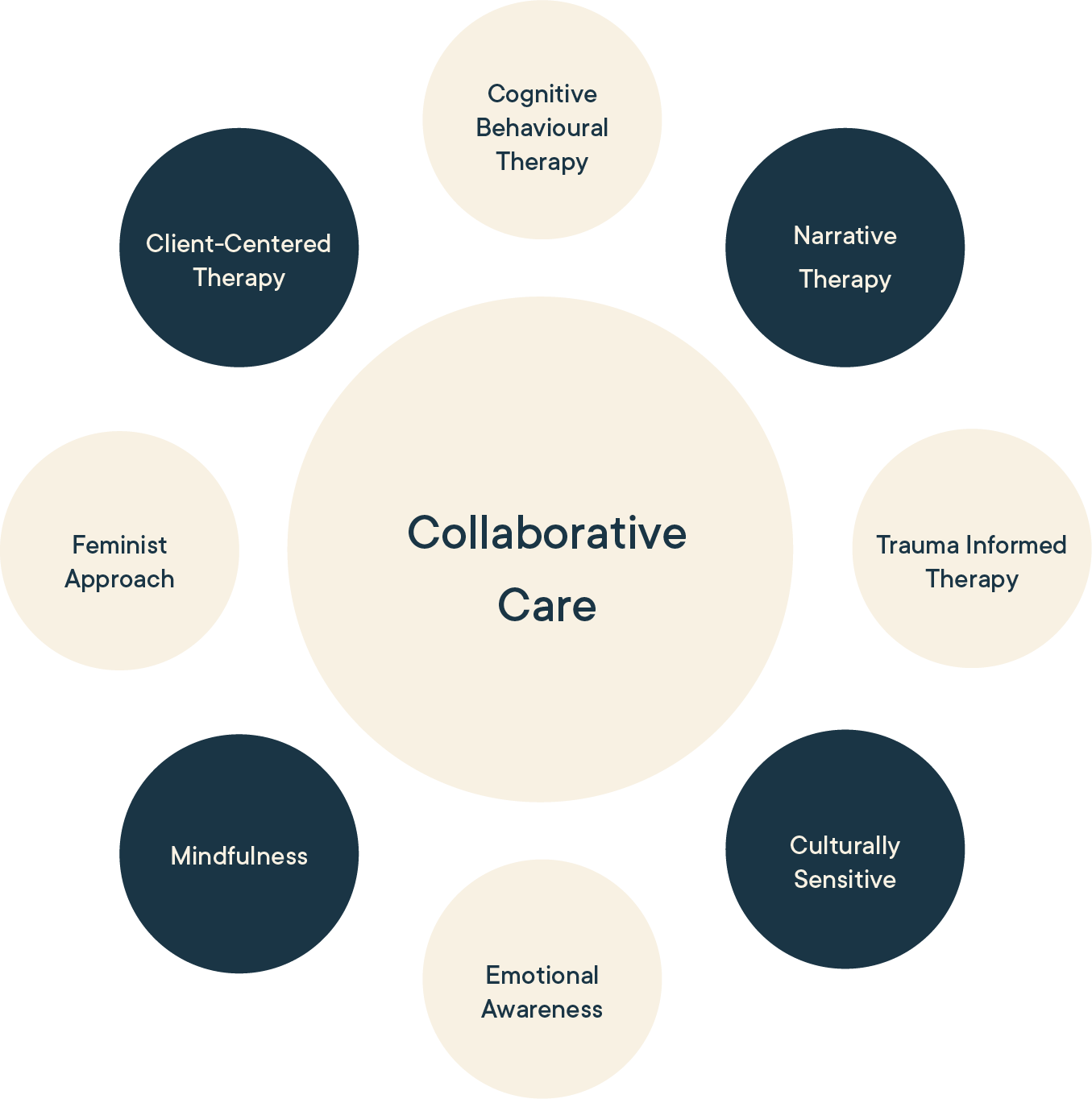How can we help you feel better?
Schedule your Free Wellness Discovery Call with Fortify’s wellness assistant.
Schedule your Free Wellness Discovery Call with Fortify’s wellness assistant.

Our skilled therapists are here to listen, genuinely care, and support you as you rediscover your strength. Therapy is a deeply personal process and you deserve a therapist who will create a safe and inviting space to work together. Each therapeutic care plan is tailored to fit your unique story, values and preferences.




Our therapists integrate a range of methods and techniques to support their clients. This type of Collaborative Care not only describes our willingness to employ multiple approaches to mental health, but to involve other modalities in supporting and sustaining mental wellbeing in all aspects. The body and mind are a whole, and should be cared for as such.
Meet one on one with a therapist to tell your story, explore your values, and expand on hope. Individual therapy provides a safe space to talk about your experiences, discover how you have been impacted by a problem, and find creative ways forward that align with what matters most to you. Individual work can help grow your internal resources, nurture healing, and support healthy connections with others.
Throughout our lives, we experience various changes. There are points where we desire growth in our relationship, find barriers that arise, and see benefit from a non-bias third-party to assist through the journey. Whether seeking conflict resolution, love, and connection, sexual disconnection, or parenting stress, couples therapy can help guide through conflict and find the value in connecting.
Similar to couple therapy, the family system is complicated and can come across several life transitions and stressors. Family counselling can consist of parenting and inter-family relations, the impact of separation or divorce. To be truly productive towards resolution and/or change, all parties must be consenting participants in family therapy.
Fortify’s certified Reproductive and Perinatal Therapist, Shayla Vechina, is here to support our patients through every stage of motherhood.
"Are you seeking support with prenatal/postpartum anxiety, life transitions, motherhood, postpartum depression or rage? Where society sends us messages about the joy in the pre and postnatal phases, I strive to normalize the conversation about both the happy times and the overwhelming, constantly learning and finding what it means to balance different asks and ever-changing identities." - Shayla Vechina
"Life is a journey that can take us places we may not have ever expected to be. Sometimes things can get heavy and can stop us from moving forward in the way we want to. You do not have to walk alone. I am here to walk beside you and help you put down some of the heaviness so that you can find the freedom you need to push forward." - Melissa Mushikori
"My approach to therapy is solution focused and strength based. I aim to help people use their strengths to create their desired future and find ways for my clients to cope with what they are facing. Sometimes life can feel like being a boat on the ocean during a storm. Let’s work together to navigate the rough waters." - Emily MacDonald
That depends (such a therapist answer)! Your therapist will recommend a frequency that fits with your resources, availability, and reasons for seeking therapy. A lot of people find it helpful to commit to regular sessions (1-2 weeks apart) at the beginning. Pretty soon you will get a feel for how often is enough for you and your therapist will regularly check in with you about this.
Therapy is a process that can require more than a couple sessions to take root. Life circumstances, frequency of sessions, and presenting concern will all contribute to how long you want to participate in therapy. We encourage you to be open with your therapist about your hopes and expectations for therapy and they will provide an honest perspective on how long therapy may last.
While our therapists can discuss diagnosis and explore possibilities with you, they cannot assess or diagnose you. They are happy to discuss diagnosis, offer you resources, and recommend that you talk with your Doctor or see a psychologist/psychiatrist for an official assessment. That being said, a diagnosis is not required to seek therapy for symptoms that you experience.
Great question! Therapy is relational and it is important that you feel heard by your therapist and increasingly comfortable sharing with them as you work together. We encourage you to book a free 10 minute meet and greet to see if you could be a good fit! Ask them about their experience and training working with concerns similar to yours, their therapeutic process/approach, and any other curiosities you may have about a potential therapist.
Some people find it helpful to bring a notebook to sessions to write down reflections, resources, or questions. If you have a fidget toy or comfort object that helps you feel present and grounded we invite you to bring those into the therapy room. We also find that a sense of humour can be an essential part of good therapy. Most importantly we ask that you bring your authentic self and a willingness to participate in an open conversation.
Phones can be great tools in therapy and you can use them to: show your therapist a picture of your dog or creative project, write notes in between sessions to help you remember what to focus on, pull up a meme or article that resonated with you, read out a text message to give context to your story. If you are awaiting an emergency call, you are of course welcome to leave alerts on.
Phones can also be distracting and we encourage you to put them away and turn off any pings of dings that could impact our ability to be present in session.
True informed consent means that you can end therapy at any time, for any reason. People end therapy for many reasons, maybe you: have financial constraints, are feeling better, aren’t feeling better, found a better fit, your therapist said something that didn’t sit right. You will always be given space to communicate your reasons for ending therapy. This gives your therapist helpful feedback, the opportunity for them to apologise, real time practice for open communication, a final session to mark the end of your work together at this time, the option for sliding scale rates and/or the possibility for referral to someone who could be a better fit.
Believe it or not we did not become therapists because we love giving advice! You will likely find that your therapist effectively dodges your requests to fix you or tell you what to do. We sincerely believe that you are the expert in your own life and our job is to help you connect with a way forward that is informed by our values, experience, and wisdom. We are trained to ask you expanding questions and creatively offer your words back to you.
Age of consent for therapy is 16. If a client is 16 years of age or older, they are deemed fit to schedule their own therapy appointments without the additional consent of a parent or guardian. If you are the parent of a child aged 12-15, parent or guardian consent is mandatory. Your therapist can guide you through the process and answer any questions regarding privacy and consent that you may have.
If you are looking to book an appointment for another consenting adult our wellness assistant can contact the potential client to discuss their desire to book a session, or obtain consent for a third party to book them an appointment.
At Fortify, we offer initial appointments that are 15 minutes longer than regular follow-up sessions. This is to allow us the extra time to go over consent and any questions you may have without filling the typical hour allotted for the session.
During our initial session, we explore presenting concerns, the impact they have on your life and create a direction to move forward to help you create goals that align your values.
Both of our therapists are counsellors and hold a Master’s Degree in Counselling Psychology. Differences within the mental health professions can come from required schooling and training received.
Psychologists in Manitoba must hold a Ph.D, psychiatrists attend medical school and social workers range in levels of schooling obtained.
Don't see the answer you're looking for? Get in touch with our Wellness Assistant
At Fortify, we offer both in-person and virtual therapy sessions. In-person allows for the presence of another person and can be a great reason to take time for yourself outside of the house. Virtual sessions can be a great option for busy schedules, or if you prefer to take the appointment from the comfort of your home. Flexibility in care is something we pride ourselves on. Should you need or wish to update your appointment at any time, we are here to assist you!